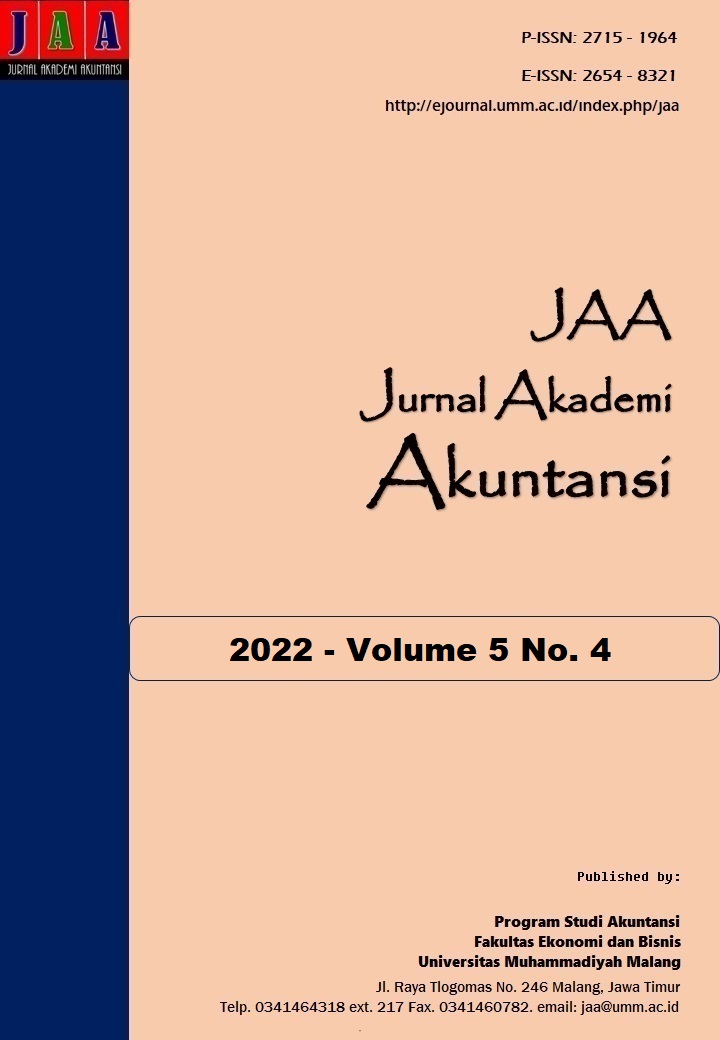Akuntabilitas Keuangan Pada Amal Usaha Muhammadiyah: Sebuah Pendekatan Kualitatif
DOI:
https://doi.org/10.22219/jaa.v5i4.27001Keywords:
Accountability, Amar Ma’ruf Nahi Munkar, Muhammadiyah, Tajdid, Ta'awunAbstract
This study aims to reveal how the Muhammadiyah organization which has many Amal Usaha Muhammadiyah (AUM) reports its financial accountability. This study uses a qualitative descriptive approach in describing how accountability is in AUM. The informant of this research is the top management of AUM in Malang City. The results of this study indicate that accountability in AUM is based on the motto amar ma'ruf nahi munkar which is internalized within the management. In addition, the values of tajdid and ta'awun also form an accountable spirit in the management. Accountability for AUM is not only a form of social responsibility but there are elements of worship, trust, and devotion to Allah SWT. The contribution of this research is to contribute to the meaning of accountability which is based on the values of Muhammadiyah's struggle, which so far has been able to form an accountable of AUM management.
Downloads
References
Ebrahim, A. (2016). The many faces of nonprofit accountability. The Jossey‐Bass handbook of nonprofit leadership and management, 102-123.
Jauhari, A. (2016). Aktivitas Muhammadiyah Dalam Bermasyarakat Dan Bernegara (Studi Muhammadiyah Kabupaten Lamongan). Jurnal politik muda, 5(2), 268-281.
Jurdi, S. (2011). Muhammadiyah dan Gerakan Civil Society: Bergerak Membangun Kultur Madani. Sulesana: Jurnal Wawasan Keislaman, 6(2), 1-14. https://doi.org/10.24252/.v6i2.1397
Kalbarini, R. Y. (2018). Implementasi Akuntabilitas dalam Shari’ah Enterprise Theory di Lembaga Bisnis Syari’ah (Studi Kasus: Swalayan Pamella Yogyakarta). Al-Tijary, 1-12. https://doi.org/10.21093/at.v4i1.1288
Rusydi, R. (2016). Peran Muhammadiyah (Konsep pendidikan, usaha-usaha di bidang pendidikan, dan tokoh). TARBAWI: Jurnal Pendidikan Agama Islam, 1(2), 139-148. https://doi.org/10.26618/jtw.v1i2.367
Sari, M., Mintarti, S., & Fitria, Y. (2018). Akuntabilitas pengelolaan keuangan organisasi keagamaan. Kinerja, 15(2), 45-56. https://doi.org/10.30872/jkin.v15i2.4029
Tanasal, S., Randa, F., & Ng, S. (2019). Akuntabilitas Berbasis Mettā dan Kamma. Jurnal Akuntansi Multiparadigma, 10(3), 448-467. http://dx.doi.org/10.21776/ub.jamal.2019.10.3.26
Unerman, J., & O'Dwyer, B. (2006). Theorising accountability for NGO advocacy. Accounting, Auditing & Accountability Journal, 19(3), 349-376. https://doi.org/10.1108/09513570610670334
Wicaksono, K. W. (2015). Akuntabilitas Organisasi Sektor Publik. JKAP (Jurnal Kebijakan dan Administrasi Publik), 19(1), 17-26. https://doi.org/10.22146/jkap.7523
Downloads
Published
Issue
Section
License
Copyright (c) 2022 Dwi Irawan, Mudrifah Mudrifah

This work is licensed under a Creative Commons Attribution-NonCommercial-ShareAlike 4.0 International License.
Jurnal Akademi Akuntansi is licensed under a Creative Commons Attribution-NonCommercial-ShareAlike 4.0 International License.
Authors who publish with this journal agree to the following terms:
- Authors retain copyright and grant the journal right of first publication with the work simultaneously licensed under a Creative Commons Attribution-NonCommercial-ShareAlike 4.0 International License that allows others to share the work with an acknowledgment of the work's authorship and initial publication in this journal.
- Authors are able to enter into separate, additional contractual arrangements for the non-exclusive distribution of the journal's published version of the work (e.g., post it to an institutional repository or publish it in a book), with an acknowledgment of its initial publication in this journal.
- Authors are permitted and encouraged to post their work online (e.g., in institutional repositories or on their website) prior to and during the submission process, as it can lead to productive exchanges, as well as earlier and greater citation of published work (See The Effect of Open Access).
Jurnal Akademi Akuntansi dilisensikan di bawah lisensi Creative Commons Attribution-NonCommercial-ShareAlike 4.0 International.
Penulis yang menerbitkan artikel di jurnal ini menyetujui ketentuan berikut:
- Penulis mempertahankan hak cipta dan memberikan hak jurnal atas publikasi pertama dengan karya yang secara serentak dilisensikan di bawah Lisensi Pengaitan Creative Commons yang memungkinkan orang lain untuk berbagi karya dengan pengakuan atas karya penulis dan publikasi awal dalam jurnal ini.
- Penulis dapat masuk ke dalam pengaturan kontrak tambahan yang terpisah untuk distribusi non-eksklusif versi karya jurnal yang diterbitkan (misalnya, mempostingnya ke repositori institusional atau mempublikasikannya dalam sebuah buku), dengan pengakuan publikasi awalnya di jurnal ini.
- Penulis diizinkan dan didorong untuk memposting pekerjaan mereka secara online (misalnya, di repositori institusional atau di situs web mereka) sebelum dan selama proses pengajuan, karena dapat mengarah pada pertukaran produktif, serta kutipan pekerjaan sebelumnya dan yang lebih besar (Lihat Pengaruh Akses Terbuka).
























